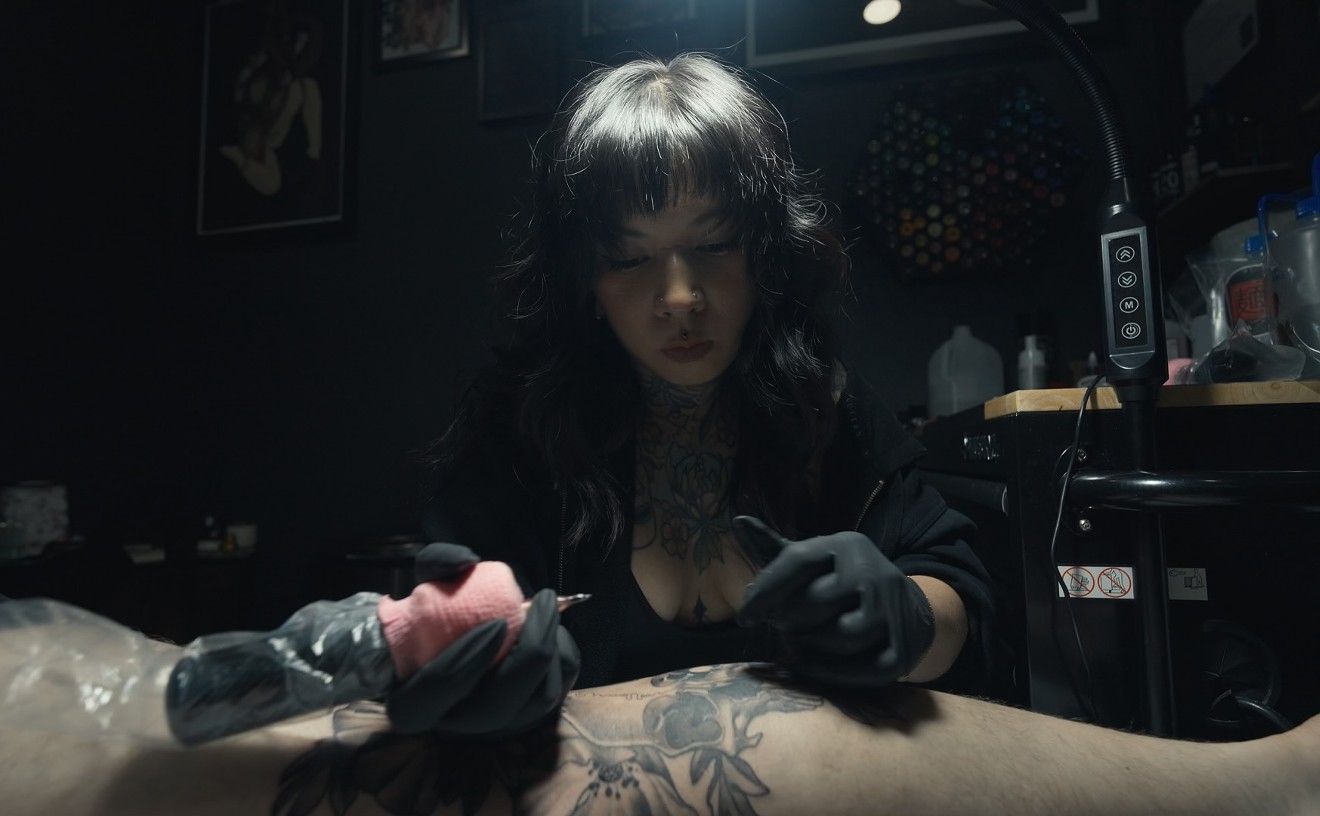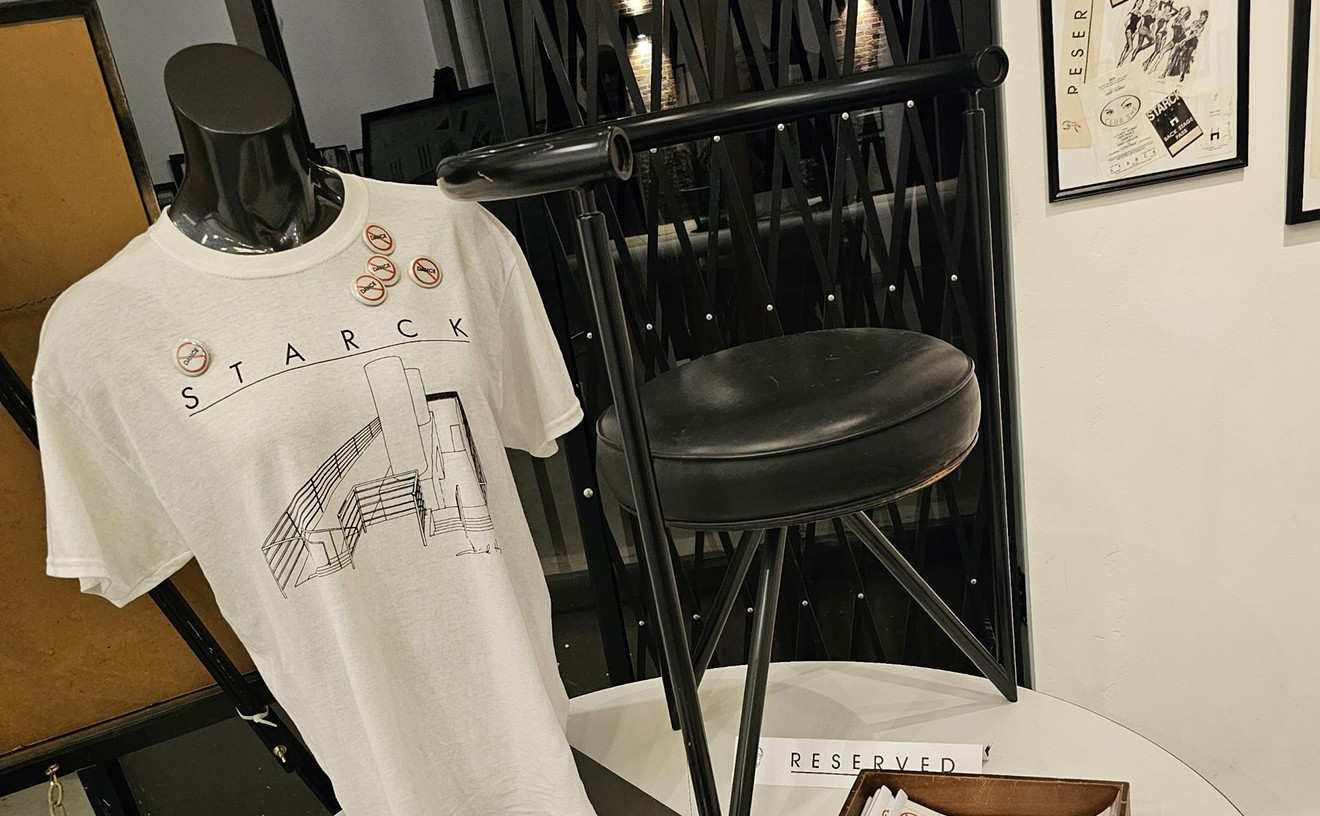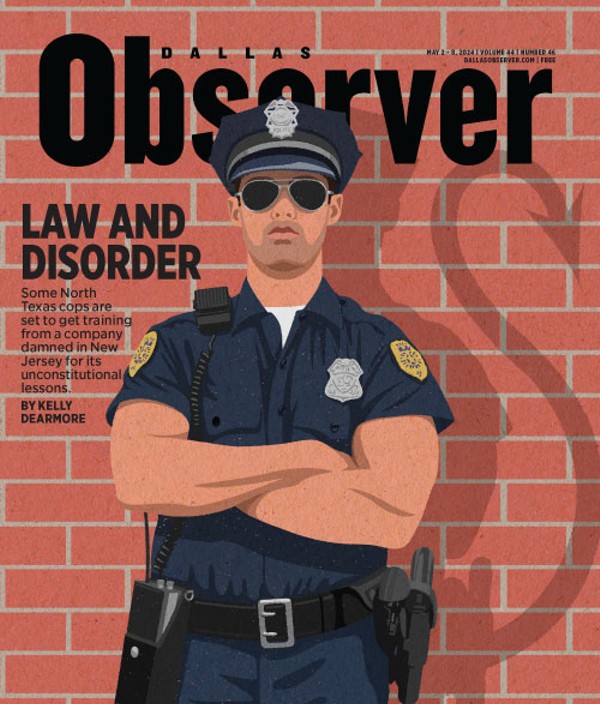A working knowledge of nature's largest invertebrate helps to get through A Man's Best Friend, the new show at Undermain Theatre. This is a weird, weird play. It would take oceans of ink, squid-made or otherwise, to describe all of its layers of weirdness. What is it about? About 70 minutes long.
Squid figure heavily in the surreal script by Jeffrey M. Jones, a favorite of Undermain director Katherine Owens. A Man's Best Friend presents six characters in search of a mollusk. The words "squid," "squim," "squid-headed baby" and "squid-head tumor" repeat so often, you wish they'd just clam up about it.
Best guess is that Jones uses "squid" as a code word for anything men feel threatened by. He could have substituted "tampon" or "street map" for "squid" and the message would have been about the same. Fixate on the fear of any "squid" too long, the play seems to say, and eventually the obsession will kill you. Squid, white whale, tuna sandwich. Whatever.
If there is a point to be made in A Man's Best Friend, Jones all but obscures it in an inky screen of crude characters and profane-for-no-reason dialogue. Where it tries to be funny, too often Friend is just scatological. This play makes The Osbournes sound like Mother Goose.
There's really not a main character here, but a mean clown named Sluggo (twitchy, whey-faced Tom Lenaghen) comes closest to being the center of attention. Sluggo taunts the audience with questions about his offensive body odor. He offers nasty pronouncements about his sexual prowess. "I'm hung like a horse, lady. Wanna get reamed?" he growls.
Sluggo confesses that he's a bed-wetter and complains about how hard it is to get laid or rent a car wearing whiteface and floppy shoes. "Everybody hates clowns," Sluggo says.
Sluggo's wife, Jane (Liza Marie Gonzalez), discusses at length her unhappy love affairs with several other Sluggos (one of them female). From the ghost of Andy Warhol (Bruce DuBose), Jane takes delivery of a "squid-head baby" whose upper regions resemble a blue rubber kitchen glove. Sluggo beats Jane to death with the tot, saying, "It looks like Daddy is having a real bad day."
Everyone says a lot more stuff about squid. It's a regular carnival of calamari.
Andy Warhol drops in from the afterlife to proclaim it all "boring" (how wise you are, Andy). DuBose doffs his silver Warhol wig to play Sluggo's mother (pretty funny actually), and then he's back as a white-robed, bearded swami who unreels a long, squid-infused monologue that sounds like a bedtime story as told by Charlie Manson.
A cop (Rhonda Boutte) runs on and off the stage, bopping Sluggo on the head with a nightstick as she searches for errant squid. A "good angel" (the supremely annoying Suzanne Thomas) wearing red sneakers and pink wig twirls around like a music-box ballerina. She harasses Sluggo and Sluggo's handsome brother Steve (John Forkner), who lies on a cot, suffering from some sort of engorged, squid-like growth in his nether regions. Toward the end of the play, the angel reaches under the covers and, while murmuring details of the sex life of squid, she energetically massages Steve's, um, tentacles. That's as close to a happy ending as this thing gets.
Funny, for all its references to squid, turns out A Man's Best Friend is a dog.
Over at Kitchen Dog Theater, another grim, surreal vision of life and the afterlife unfolds in Heaven, a two-act comedy by Canadian playwright George F. Walker. Heavenly, it's not. This play is to theatrical entertainment what the trampoline is to transportation. People get on and off and bounce around in almost constant motion, but it never really goes anywhere.
The setting, nicely designed by Craig Siebels, is a dreary urban park furnished with a couple of benches, a street lamp, an old upturned bathtub and a large garbage bin. The action begins with a bad cop named Karl (Gregory Gormley) angrily pointing his gun at the head of a human rights lawyer named Jimmy (Christopher Carlos). Karl's partner has been killed and he blames Jimmy. But Jimmy has his own problems. His wife, Judy (Karen Parrish), is pregnant again and probably in love with her rabbi (James Venhaus, quietly underplaying the role).
Catholic Jimmy, swigging nervously from a jeroboam of champagne, engages Judy in a noisy confrontation about their different views of religion, abortion and marital fidelity. They've fled a party where Jimmy had a scuffle with Judy's lover. "My wife's rabbi beat me up. Cocksucker hates Catholics," barks Jimmy. "He stood over me awhile, grinning like the lunatic Zionist that he is."
Listening to Jimmy rant about Judaism and Judy-ism in the middle of needle park are a drug dealer named Derek (Michael Turner) and his crackhead girlfriend Sissy (Wrenn Schmidt). Derek's in dutch with Karl over a missing gun. When Sissy is conscious, she's juggling, riding a unicyle or clomping around on metal stilts, learning to be a "busker." Karl shoots Sissy up with drugs and plugs two bullets into Derek.
By the end, everyone's dead but the rabbi and Sissy. Dead but not gone. Karl, Derek, Jimmy and Judy reappear to become the heavenly hosts of their own goofy talent show. Judy lives out her fantasies of being an action hero and a surgeon. She turns into a movie musical star in a Fred-and-Ginger musical number with Derek that comes out of nowhere and plays like a direct lift from the work of the brilliant Singing Detective writer Dennis Potter. Jimmy takes the spotlight with a bad impression of Lenny Bruce, complete with mike, wooden stool and water glass.
With its noisy harangues about religion, bigotry and oral sex, Heaven, directed at Kitchen Dog by Tina Parker, weighs heavy under its own air of cynical self-righteousness. Playwright Walker works too hard at all of it, pounding away at his themes like an electric nail gun on Styrofoam.
Throughout this play's long two acts, Walker trips over his writerly influences. He infuses Heaven with F-bombs and sudden violence, but instead of David Mamet, he only delivers warmed-over Miami Vice. Samuell Beckett placed characters in wheelchairs and garbage cans in his exploration of the afterlife in Endgame. In Heaven, Walker puts Jimmy in a wheelchair, but with little purpose or effect. Jimmy simply stands up and kicks the chair away. Karl's sudden emergence from the dumpster in Act 2 brings to mind Sesame Street's Oscar the Grouch more than any symbol of existential angst.
The actors toil feverishly, too, but in the wrong directions. Parrish locks onto an expression as sour as an old pan of cabbage and keeps it on all night. Gormley's Karl should be a tightly wound monster, but the actor manages only Barney Fife with extra ammo. Carlos overacts as Jimmy and often seems unfocused, as if he didn't quite have a bead on the character. Turner is fine as Derek, but his frantic energy makes him rush his words. Schmidt is light as air as the ethereal Sissy. And brava to her for mastering the juggling.
The play, clouded in bitterness and negativity, comes to a go-to-hell conclusion. In his stand-up finale (which grinds on for an eternity), Jimmy sums up Heaven's infernal philosophy: "Everybody hates everybody. Let's just go with that and see where that takes us."
And don't forget to have a nice day.










